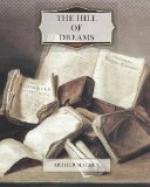was pretty obvious, he thought, that the stuff was
poor and beneath the standard of publication.
The book had taken a year and a half in the making;
it was a pious attempt to translate into English prose
the form and mystery of the domed hills, the magic
of occult valleys, the sound of the red swollen brook
swirling through leafless woods. Day-dreams and
toil at nights had gone into the eager pages, he had
labored hard to do his very best, writing and rewriting,
weighing his cadences, beginning over and over again,
grudging no patience, no trouble if only it might be
pretty good; good enough to print and sell to a reading
public which had become critical. He glanced
through the manuscript in his hand, and to his astonishment,
he could not help thinking that in its measure it was
decent work. After three months his prose seemed
fresh and strange as if it had been wrought by another
man, and in spite of himself he found charming things,
and impressions that were not commonplace. He
knew how weak it all was compared with his own conceptions;
he had seen an enchanted city, awful, glorious, with
flame smitten about its battlements, like the cities
of the Sangraal, and he had molded his copy in such
poor clay as came to his hand; yet, in spite of the
gulf that yawned between the idea and the work, he
knew as he read that the thing accomplished was very
far from a failure. He put back the leaves carefully,
and glanced again at Messrs Beit’s list.
It had escaped his notice that
A Bad Un to Beat
was in its third three-volume edition. It was
a great thing, at all events, to know in what direction
to aim, if he wished to succeed. If he worked
hard, he thought, he might some day win the approval
of the coy and retiring Miranda of
Smart Society;
that modest maiden might in his praise interrupt her
task of disinterested advertisement, her philanthropic
counsels to “go to Jumper’s, and mind
you ask for Mr. C. Jumper, who will show you the lovely
blue paper with the yellow spots at ten shillings
the piece.” He put down the pamphlet, and
laughed again at the books and the reviewers:
so that he might not weep. This then was English
fiction, this was English criticism, and farce, after
all, was but an ill-played tragedy.
The rejected manuscript was hidden away, and his father
quoted Horace’s maxim as to the benefit of keeping
literary works for some time “in the wood.”
There was nothing to grumble at, though Lucian was
inclined to think the duration of the reader’s
catarrh a little exaggerated. But this was a
trifle; he did not arrogate to himself the position
of a small commercial traveler, who expects prompt
civility as a matter of course, and not at all as
a favor. He simply forgot his old book, and resolved
that he would make a better one if he could. With
the hot fit of resolution, the determination not to
be snuffed out by one refusal upon him, he began to
beat about in his mind for some new scheme. At
first it seemed that he had hit upon a promising subject;




